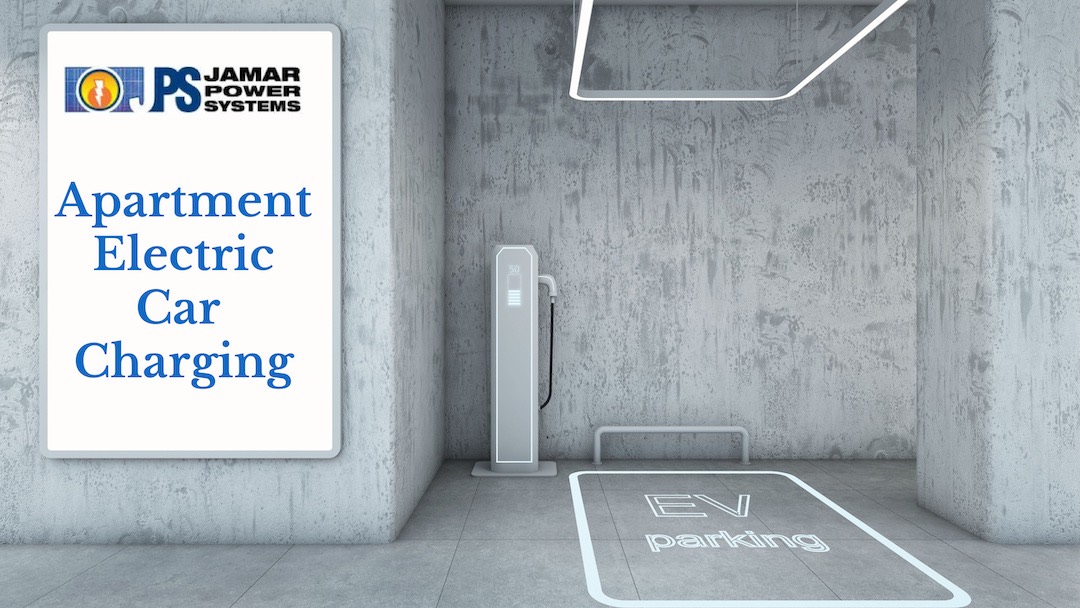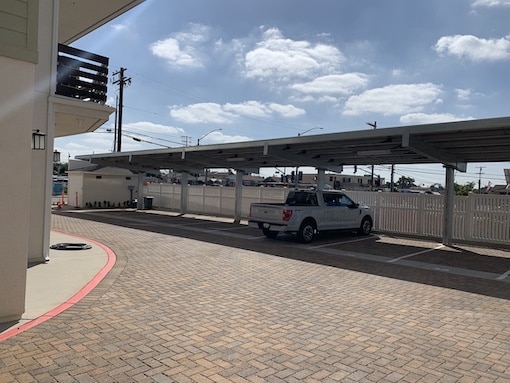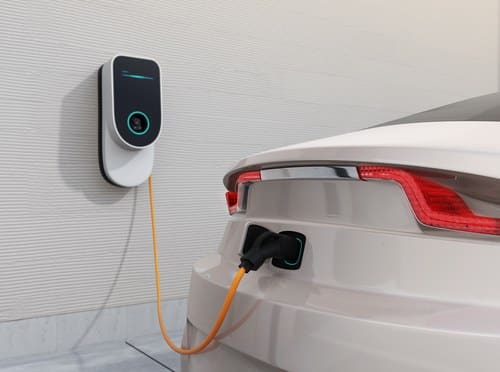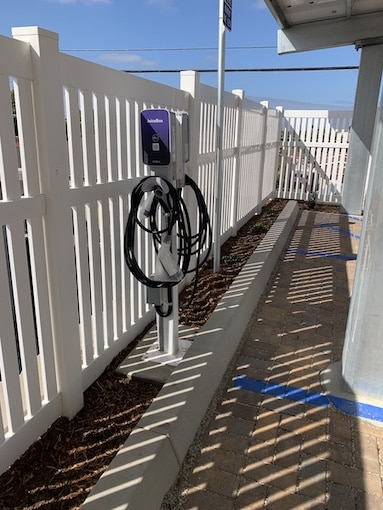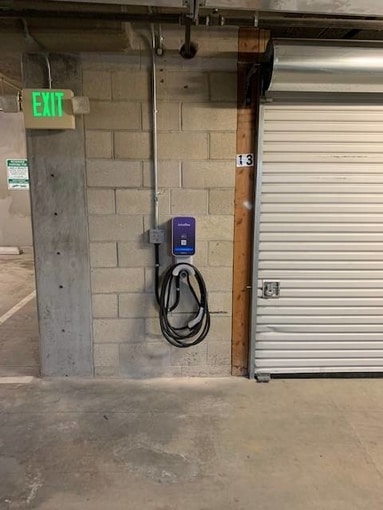Apartment Electric Car (EV) Charging
(Info & Services)
In the United States, 44 million people rent their dwellings, and 36% live in apartments. This statistic means many people can’t install a charger for their EVs.
The lack of EV charging stations at apartment complexes frustrates EV owners who rent because they can’t install a charger in a garage as a homeowner could. There are different parking options for apartment complexes, including:
- Assigned parking
- Shared parking
- Personal garage
Each type of available apartment parking has an electric car charging solution.
Tenants and apartment owners need to know about their options for electric car (EV) charging to ensure they’re informed.
This article explores the topic from both perspectives:
1) how tenants of apartment buildings may be able to charge their electric cars.
2) how apartment complex owners can attract tenants and increased revenues through EV charging stations and what’s involved in the process.
Click on the section that applies to you:
EV Charging For Apartment Tenants
Charging An Electric Car At An Apartment
The best way to charge your electric vehicle at an apartment complex is to ask the landlord to install a charging station. Tesla even provides a template letter on its site to help tenants streamline the process.
Note that it’s not always possible from an engineering or cost standpoint. There are several factors that may make running electricity to the desired location(s) unfeasible. A site evaluation would be required to find out.
If tenants have a personal garage at the apartment complex they can negotiate with management to have the apartment complex pay all costs, share in the costs, or have the tenant incur all costs.
The same options apply if tenants have assigned parking situations.
In cases where parking is shared and unassigned, management would need to designate one or more areas as electric vehicle parking only and install charging stations in those locations.
If management is not willing or able to install charging stations, there are still other options.
If you don’t have a personal garage at your apartment, look around for wall sockets in the parking structure. These standard outlets can handle your Level 1 portable EV charger.
Before you charge your car, ask the landlord if you can use those electrical outlets. Charging your car at the apartment will raise electricity usage, so you want to ensure they know and approve that you’re using it.
If charging at your apartment is not an option at all, consider charging at your workplace. Some offices willingly install charging stations for their employees.
Charging during the workday can give you as much power as charging overnight. Ask your employer if they’d like to discuss the topic with you.
You can also charge your car while you’re out during the day. Find public charging stations using apps like PlugShare and OpenChargeMap.
The U.S. Department of Energy also has a map of electric vehicle charging stations that you can filter according to the charging levels.
Types Of EV Charging Stations
There are different charging stations based on how quickly they charge and what power and outlets they use.
You can use your Level 1 charger with a standard electrical outlet. It takes longer since you’re only getting 120 volts, which translates roughly to about five miles of range for every hour you charge.
Most manufacturers include a Level 1 charger with the EV as a portable option. This cord boosts your mileage, but it takes a long time to get a full charge.
Level 2 charging stations are faster. They use 240 volts, just like your air conditioner. Depending on your electric vehicle’s make and model, a Level 2 Charging Station can fully charge the EV from empty to full in 4 to 10 hours.
DC Fast Charging, including Tesla Supercharging, is what you’ll access at most public charging stations. It uses direct current (D.C.) to quickly charge the battery without converting alternating current (A.C.) to D.C.
EV Charging for Apartment Owners
Over 2 million electric vehicles are registered in the U.S.A. These figures are consistently growing as EVs increase in popularity.
Many apartment complexes proactively install charging stations, even if residents aren’t asking for them. They take this step to attract new high-quality tenants and add value to the property.
Get tax credits too! EVs and their charging stations may qualify for federal income tax credits to lower costs. Consult your tax advisor.
[2025 UPDATE] THESE TAX CREDITS NOW END ON DECEMBER 31, 2025 as a result of the 2025 Budget Reconciliation Bill passed by Congress and signed by the President July 4, 2025.
The National Apartment Association recommends that properties install chargers because there’s already a demand for this feature. Instead of putting the responsibility on tenants to request charging stations, you’re providing them with an amenity they need.
If you have charging stations on your property, it’s value-added and justifies charging a higher rent. You may need that income to pay for the added electricity, and tenants will be willing to pay for the convenience.
Consider location when you’re installing charging stations. Instead of scattering Level 2 chargers around the lot, consider keeping them in one location.
It’s best to position EV charging stations in a designated area with signage, so there’s less risk of standard vehicles parking in a charging spot.
Installing chargers can be expensive, depending on your electric infrastructure, but it’s worth the investment.
If installing Level 2 charging stations is cost-prohibitive, consider providing spaces for tenants to easily use standard outlets and Level 1 chargers, as it’s better than nothing.
Keep in mind that California has accessibility regulations about EV charging. At least 3% of every parking lot should provide access to chargers. Check your state laws to see what guidelines you need to follow.
Request a site evaluation and quote from us to install Level 2 EV charging stations at your apartment complex using the form below.
Summary
Apartment electric car (EV) charging is becoming necessary as more people buy EVs, even if they’re renters.
Charging at home is the most convenient way to get a full charge since you can leave your car plugged in overnight, whether you have a Level 1 or Level 2 charger.
If your apartment complex doesn’t have a charging station, consider requesting one from management.
Apartment owners find great value in installing charging stations because they can increase rent and draw in new tenants.
Whether you’re a resident or an apartment owner, there’s no need to wait. Get a quote from us today to install an E.V. charging station and improve parking conditions.
Lower costs even more by using solar energy to power your charging station and electric vehicle! Check out our article on solar E.V. charging here.
Request A Quote For EV Charging Station Installation(s)
- 2025 Federal Tax Credit Changes For Solar Panel Systems & Solar Batteries - July 8, 2025
- How Solar Batteries Work - March 4, 2024
- Solar Battery or Generator for Emergency Backup Power? - January 30, 2024

